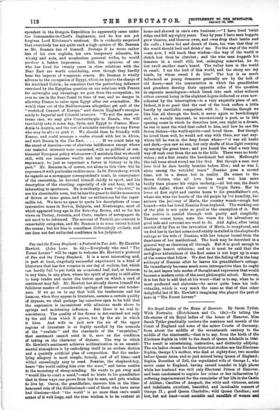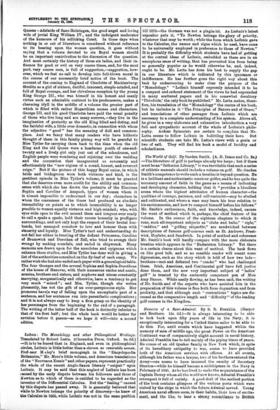Six Royal Ladies of the House of Hanover. By Sarah
Tytler. With Portraits. (Hutchinson and Co. 12s.)—In telling the life-stories of six Royal ladies of the house of Hanover, Miss Sarah Tytler practically reviews the manners and morals of the Court of England and some of the minor Courts of Germany, from about the middle of the seventeenth century to the middle of the nineteenth,—that is to say, from the birth of the Electress Sophia in 1680 to the death of Queen Adelaide in 1849. The result is entertaining, instructive, and distinctly edifying. The six ladies chosen for these historical studies are the Electress Sophia, George L's mother, who died at eighty-four, two months before Queen Anne, and so just missed being Queen of England ; Sophia Dorothea of Zell, the repudiated wife of George I., who never came to England, having caused scandal in high places while her husband was still only Electoral Prince of Hanover, and been condemned to expiate her crime or her indiscretion by suffering imprisonment for the remainder of her life in the Castle of Ahlden ; Caroline of Anspach, the witty and virtuous, astute and indelicate, excellent, beautiful, and invaluable consort of George IL; good Queen Charlotte ; wild Queen Caroline; and last, but not least—most amiable and unselfish of women and Queens —Adelaide of Saxe-Meiningen, the good angel and loving wife of jovial King William IV., and the indulgent moderator of the humours of his rollicking Court. In these days when nothing in or out of literature is considered without reference to its bearing upon the woman question, it goes without sa3ing that a volume devoted to six Royal women should be an important contribution to the discussion of the question. And most certainly the history of these six ladies, and their in- fluence for good or evil on very coarse times, and, for the most part, very coarse men, is fall of suggestion,—suggestion, how- ever, which we feel no call to develop into full-blown moral in the course of our necessarily brief notice of the book. The account of the coming to England of Charlotte of Mecklenburg- Strelitz as a girl of sixteen, dutiful, innocent, simple-minded, and full of Royal courage, and her chivalrous reception by the young King George III., who was himself in his honest and manly virtue such an admirable contrast to his predecessors, makes a charming idyll in the middle of a volume the greater part of which is filled with rather Hogarthian scenes and characters. George III. and his good Charlotte have paid the usual penalty of those who live long and see many sorrows,—they live in the imagination of posterity as the old King blind and doting, and the faithful wife, a little over-domestic, in connection with whom the adjective " good " has the meaning of dull and common- place. And we fancy that many readers who have hitherto thought of them in this faintly pining way will be grateful to Miss Tytler for carrying them back to the time when the old King and the old Queen were a handsome youth of one-and- twenty and a lively girl only just out of the schoolroom, and English people were wondering and rejoicing over the wedding and the coronation that inaugurated so reverently and affectionately the "new regime of a sound, honest, and reverent reign." But if the picture of this happy Royal union, in which bride and bridegroom were both virtuous and kind, is the prettiest episode in Miss Tytler's volume, it must be granted that she deserves even more credit for the ability and common- sense with which she has drawn the portraits of the Electress Sophia and Caroline of Anspach, types of women whom it is almost impossible to understand in our day ; characters in whom the coarseness of the times had produced an absolute insensibility on points as to which insensibility is no longer possible to women equally virtuous and high-minded; who, with eyes wide open to the evil around them and tongues ever ready to call a spade a spade, held their course honestly in profligate surroundings, and not only kept the respect of their brutal hus- bands, but managed somehow to love and honour them with sincerity and loyalty. Miss Tytler's tact and understanding do not fail her either in treating of the defiant Princesses, Caroline of Brunswick and Dorothea of Zell, who tried to avenge their wrongs by making scandals, and ended in shipwreck. Many memoirs are drawn upon for the anecdotes and epigrams which enhance these studies, and Miss Tytler has done well in giving a list of the authorities consulted on the fly-leaf of each essay. We rather wish she had also ended each paper with a genealogical table. The four Georges and the several Sophias and Sophia-Dorotheas of the house of Hanover, with their numerous uncles and aunts, cousins, brothers and sisters, and nephews and nieces constantly marrying, morganatically and otherwise, have a tendency to get very much " mixed "; and Mrs. Tytler, though she writes pleasantly, has not the gift of an over-perspicuous style. Her pronouns have:a way of falling upon the unemphatic part of a sentence, and her sentences run into parenthetic complications ; and it is not always easy to keep a firm grasp on the identity of her personages from the beginning to the end of a paragraph. The writing of the latter half of the book is distinctly inferior to that of the first half ; but the whole book would be better for revision before it passes—as we hope it will—into a second edition.



















































 Previous page
Previous page